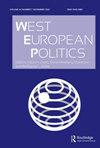技术呢?在选举动荡时期淡化治理责任
IF 4.5
1区 社会学
Q1 POLITICAL SCIENCE
引用次数: 3
摘要
技术官僚主义最近引发了越来越多的学术兴趣,特别是作为一种替代政党政府和民粹主义的统治形式。在西欧执政党所面临的政党-公民联系减弱和外部约束增加的背景下,技术官僚任命可能有助于处理彼得·梅尔强调的责任-回应困境。然而,对技术官僚任命的解释因素的研究仍不发达。本文认为,对技术官僚的求助是由选举的不稳定所推动的。在选举高度动荡的背景下——尤其是在政党频繁进出政党体系的情况下——执政党转向技术官僚任命,以淡化责任。这一期望通过一个原始的纵向多层数据集进行了测试,该数据集包括20个西欧国家从1945年到2021年的655个内阁和373个选举。本文的研究结果有助于当前关于技术官僚的辩论,并为政治代表制背后的一般理解提供了新的视角。本文章由计算机程序翻译,如有差异,请以英文原文为准。
Going technocratic? Diluting governing responsibility in electorally turbulent times
Abstract Technocracy has recently triggered growing scholarly interest, especially as an alternative form of ruling to both party government and populism. In the context of weakened parties-citizens links and increasing external constraints faced by Western European ruling parties, technocratic appointments might help deal with the responsibility-responsiveness dilemma highlighted by Peter Mair. However, research on the explanatory factors of technocratic appointments is still underdeveloped. This article argues that the recourse to technocracy is fuelled by electoral volatility. In contexts of high electoral turbulence – and even more when parties frequently enter or exit the party system – ruling parties turn to technocratic appointments to dilute responsibility. This expectation is tested through an original longitudinal multilevel dataset including 655 cabinets and 373 elections in 20 Western European countries from 1945 to 2021. The findings of this article contribute to the current debate on technocracy and shed new light on the general understanding behind political representation.
求助全文
通过发布文献求助,成功后即可免费获取论文全文。
去求助
来源期刊

West European Politics
POLITICAL SCIENCE-
CiteScore
10.00
自引率
7.10%
发文量
58
期刊介绍:
West European Politics (WEP)has established itself as one of the most authoritative journals covering political and social issues in Western Europe. It has a substantial reviews section and coverage of all national elections in Western Europe. Its comprehensive scope, embracing all the major political and social developments in all West European countries, including the European Union, makes it essential reading for both political practitioners and academics.
 求助内容:
求助内容: 应助结果提醒方式:
应助结果提醒方式:


